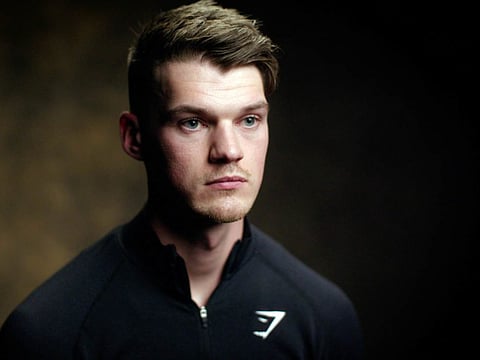From pizza delivery guy to youngest billionaire: Gymshark fitness empire's story
Ben Francis started as a pizza delivery guy who just wanted better gym clothes

Ben Francis is the youngest billionaire you probably didn’t even know existed.
Once a pizza delivery guy making late-night runs, he started with just £500 ($650) and a sewing machine in his mom’s garage.
Then, he methodically built Gymshark into a $1.4 billion sports apparel powerhouse.
Sounds crazy? It gets better.
In 2012, while studying business at Aston University in Birmingham, England, 19-year-old Ben was juggling classes by day and delivering pizzas by night for £5 ($6.70) per hour.
Between shifts, he obsessed over a gap in the fitness apparel world that brands like Nike, Adidas, and Puma completely missed.
His daily routine at age 19:
Deliver pizzas until 9 PM
Sew bodybuilding clothes until 4 AM
Study business during the day
Repeat
His first “headquarters”?
His mom’s garage, filled with hand-cut fabrics, protein shake spills, and pure ambition.
Fast forward to 2023: Ben was awarded an MBE (Member of the Order of the British Empire) for his services to the business sector, his entrepreneurial achievements and Gymshark’s growth.
At that time, he gave one piece of advice: “Bet on yourself.”
How did he do it?
Ben saw a breakthrough which most people in the industry failed to see: spotting a new kind of influencer.
While the big brands battled over celebrity athletes, Ben noticed something different bubbling up online: Fitness YouTubers.
They had small but rabid audiences — and zero brand deals.
Ben Francis’s genius move?
He sent free Gymshark gear to YouTubers with just 50,000 to 100,000 subscribers — when nobody else cared.
Influencers like Matt Ogus, Jeff Seid, and Chris Lavado wore their stuff and fans went crazy.
Cost per influencer: Around £30 ($40).
Return on investment: Mind-blowing.
His scaling strategy:
• Partner with micro-influencers before they blow up.
• Build real relationships, not just transactions.
• Create artificial scarcity with limited drops.
• Focus on community over corporate branding.
• Stay ridiculously close to customer feedback.
Loyalty
Here's why is the micro-influencer strategy proved brilliant: As these YouTubers skyrocketed to millions of followers, they stayed fiercely loyal to Gymshark — giving the brand grassroots credibility the big guys couldn’t buy.
“It wasn’t about paying celebrities; it was about building community,” Ben later told Business Insider.
2013: The Fitness Expo gamble
Gymshark’s first major public test was a bodybuilding expo in 2013, just a year after being founded in a garage.
Ben and his team borrowed money just to afford a tiny booth. They were terrified no one would come.
Reality? The booth was swarmed. Thousands of fans lined up to meet their favorite YouTubers — all rocking Gymshark.
Result? The entire inventory sold out in 90 minutes. Revenue that year? £250,000 ($325,000).
2015: Disaster strikes — and the power of authenticity
As Gymshark grew, so did the growing pains. On Black Friday 2015, the website crashed under the flood of orders.
Ben lost hundreds of thousands of pounds in sales — and thousands of customers were furious.
Instead of hiding behind PR spin, Ben Francis posted a raw, heartfelt apology video online.
The result? Customers forgave him — and became even more loyal.
The incident taught Ben a critical lesson: In the social media age, authenticity beats corporate perfection.
People don’t expect you to be perfect — they expect you to be realBen Francis, Gymshark
He told Forbes in 2021: “People don’t expect you to be perfect — they expect you to be real.”
There's something else: "Motivation won’t cut it, obsession will."
Here's another one: "A short workout is better than no workout".
This authenticity, this obsession, helped Gymshark beat the giants.
How Gymshark outran the giants
Ben’s scaling strategy was deceptively simple, but devastatingly effective:
Spot micro-influencers early — and build real relationships.
Create artificial scarcity — through limited edition product drops.
Focus on community over corporate branding — fans over ads.
Stay ridiculously close to customers — replying, listening, adapting.
Move fast and stay scrappy — even as revenue soared.
By 2020, Gymshark was valued at over $1.3 billion after securing an investment from General Atlantic.
At just 28 years old, Ben Francis became one of the UK’s youngest billionaires — while still owning 70% of the company.
From garage to global stage
Ben now runs Gymshark from a flashy new headquarters in Birmingham but still acts like the scrappy kid with a sewing machine.
The brand is now taking on Nike and Adidas head-to-head — and winning hearts, not just dollars.
Not bad for a pizza delivery guy who just wanted better gym clothes.
5 lessons from the gym, according to Ben Francis:
Discipline
Social skills
Consistency Patience,
Goal setting.
Sign up for the Daily Briefing
Get the latest news and updates straight to your inbox


